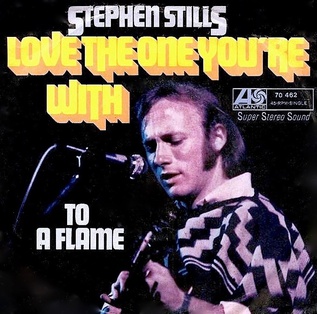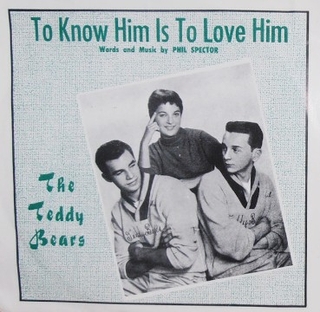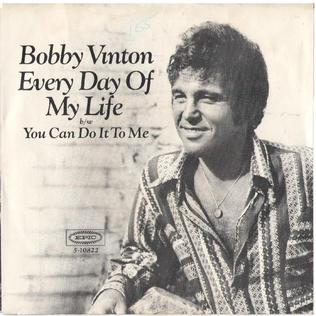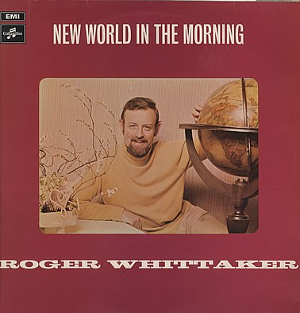
Worldwide, the English rock band the Beatles released 12 studio albums, 5 live albums, 51 compilation albums, 36 extended plays (EPs), 63 singles, 17 box sets, 22 video albums and 53 music videos. In their native United Kingdom, during their active existence as a band, they released 12 studio albums, 1 compilation album, 13 EPs, and 22 singles. The early albums and singles released from 1962 to 1967 were originally on Parlophone, and their albums and singles from 1968 to 1970 were on their subsidiary label Apple. Their output also includes vault items, remixed mash-ups and anniversary box-sets.

"Me and Bobby McGee" is a song written by American singer-songwriter Kris Kristofferson and originally performed by Roger Miller. Fred Foster shares the writing credit, as Kristofferson wrote the song based on a suggestion from Foster. A posthumously released version by Janis Joplin topped the U.S. singles chart in 1971, making the song the second posthumously released No. 1 single in U.S. chart history after "(Sittin' On) The Dock of the Bay" by Otis Redding. Gordon Lightfoot released a version that reached number 1 on the Canadian country charts in 1970. Jerry Lee Lewis released a version that was number 1 on the country charts in December 1971/January 1972 as the "B" side of "Would You Take Another Chance On Me." Billboard ranked Joplin's version as the No. 11 song for 1971.

Roger Henry Brough Whittaker was a British singer-songwriter and musician, who was born in Nairobi in then British Kenya to English parents. His music is an eclectic mix of folk music and popular songs in addition to radio airplay hits. He is best known for his baritone singing voice and trademark whistling ability as well as his guitar skills.

John Lennon was a British singer-songwriter and peace activist, best known as the co-founder of the Beatles. After three experimental albums with Yoko Ono, using tape loops, interviews, musique concrète, and other avant-garde performance techniques, Lennon's solo career properly began with the 1969 single "Give Peace a Chance". Lennon then released two more singles, "Cold Turkey" (1969) and "Instant Karma!" (1970), and a live album, Live Peace in Toronto (1969), before the official break-up of the Beatles.

"He Ain't Heavy, He's My Brother" is a ballad written by Bobby Scott and Bob Russell. Originally recorded by Kelly Gordon in 1969, the song became a worldwide hit for the Hollies later that year and also a hit for Neil Diamond in 1970. It has been recorded by many artists in subsequent years. The Hollies' version was re-released in 1988 and again was a major hit in the UK.

"Proud Mary" is a song by American rock band Creedence Clearwater Revival written by John Fogerty. It was released as a single in January 1969 by Fantasy Records and on the band's second studio album, Bayou Country. The song became a major hit in the United States, peaking at No. 2 on the Billboard Hot 100 in March 1969, the first of five singles to peak at No. 2 for the group.

"Get Together", also known as "Let's Get Together" and "Everybody Get Together", is a song by American rock band the Youngbloods, originally included in their 1967 debut album The Youngbloods. It was written in the mid-1960s by American singer-songwriter Chet Powers, from psychedelic rock band Quicksilver Messenger Service. The single was The Youngbloods' only Top 40 on Billboard Hot 100—peaking at No. 5 in 1969.

"Love the One You're With" is a song by American folk rock musician Stephen Stills. It was released as the lead single from his debut self-titled studio album in November 1970. The song, inspired by a remark Stills heard from musician Billy Preston, became his biggest hit single, peaking at No. 14 on the Billboard Hot 100 in early 1971. David Crosby and Graham Nash, Stills' fellow members of Crosby, Stills & Nash, provide background vocals on the song. Also providing the backups are Rita Coolidge, her sister Priscilla Jones, and John Sebastian. They all sing the "Do Dos" that come before the instrumental portion and the Outro. The song was also recorded by the Isley Brothers, The Meters, Bucks Fizz, Luther Vandross, Bob Seger and Richard Clapton, among others.

"To Know Him Is to Love Him" is a song written by Phil Spector, inspired by words on his father's tombstone, "To Know Him Was to Love Him." It was first recorded by the only vocal group of which he was a member, the Teddy Bears. Their recording spent three weeks at No. 1 on the Billboard Hot 100 chart in 1958, while reaching No. 2 on the UK's New Musical Express chart. Peter & Gordon and Bobby Vinton later had hits with the song, with its title and lyrics changed to "To Know You Is to Love You". In 1987, the song was resurrected by Dolly Parton, Linda Ronstadt, and Emmylou Harris, whose Trio recording topped the U.S. country singles chart. The song is in 12/8 time.

"Just One Look" is a song co-written by American R&B singers Doris Troy and Gregory Carroll. The recording by Doris Troy was a hit in 1963. The Hollies, Anne Murray, Linda Ronstadt and Iain Matthews each achieved great success with the song. There have also been many other versions.

"Husbands and Wives" is a song written and first recorded by American country music singer Roger Miller. Miller's original, from his album Words and Music, was released in February 1966 and was a crossover hit for him, reaching Top Ten on the U.S. country and Adult Contemporary charts, as well as Top 40 on the pop charts. Since the release of Miller's original, the song has been covered by several other artists, including The Everly Brothers, Ringo Starr, Neil Diamond, a duet between David Frizzell and Shelly West, Jules Shear, and Brooks & Dunn, whose version was a number-one country hit in 1998.
"The Last Farewell" is a song from 1971 by British folk singer Roger Whittaker and Ron A .Webster. Whittaker hosted a radio programme in The United Kingdom in 1971, backed by an orchestra with arrangements by Zack Lawrence. Whittaker says "one of the ideas I had was to invite listeners to send their poems or lyrics to me and I would make songs out of them. We got a million replies, and I did one each week for 26 weeks."

"Ev'ry Day of My Life" is a popular song written in 1954 by Al Jacobs and Jimmie Crane.

New World in the Morning is a studio album by Roger Whittaker released on the EMI label in 1971. It featured some of his most popular songs, including "The Last Farewell", "A Special Kind of Man", the title track "New World in the Morning" and "Streets of London".
"Fox on the Run" is a song written by Tony Hazzard, first recorded by the English band Manfred Mann, and released as a single on 29 November 1968. It reached No. 5 on the UK Singles Chart in late January 1969.

The singles discography of American country artist Dottie West contains 71 singles, 12 collaborative singles, 3 promotional singles and 1 other charting song. West signed with RCA Victor Records in 1963, having her first Top 40 hit the same year. It was followed in 1964 by "Love Is No Excuse", a duet with Jim Reeves that became West's first top 10 hit. In 1964, she also released "Here Comes My Baby". The song reached number 10 on the Billboard Hot Country Singles chart and became the first song by a female country artist to win a Grammy award. From her 1966 album, West issued four singles, including the top 10 hits "Would You Hold It Against Me" and "What's Come Over My Baby". Over the next two years she had major hits with "Paper Mansions", "Like a Fool", "Country Girl", and "Reno". In 1969, West collaborated with Don Gibson on "Rings of Gold", which reached number 2 on the Billboard country chart. In 1973, she released a single version of a commercial jingle originally used by The Coca-Cola Company. Entitled "Country Sunshine", the song became West's biggest hit, reaching number 2 on the country songs chart and number 49 on the Billboard Hot 100. The song also nominated her for her eleventh Grammy. After releasing the top 10 hit "Last Time I Saw Him" (1974), West's chart hits declined and she was dropped from RCA in 1976.

"So Sad (To Watch Good Love Go Bad)" is a song written by Don Everly, which was released by The Everly Brothers in 1960. The song was later a country hit for multiple artists in the 1970s and 80s.
"1900 Yesterday" is a song written by John Cameron and Lee Simmons. The song was originally released by Betty Everett in 1969 on the album There'll Come a Time.

"Easy Come, Easy Go" is a song written by Jack Keller and Diane Hildebrand that was a hit single for Bobby Sherman in 1970.

"I Don't Believe in If Anymore" is a song by British singer-songwriter Roger Whittaker, released as a single in March 1970. It peaked at number 8 on the UK Singles Chart. After the success of "The Last Farewell" in 1975, the song was re-released.

















